
SC: 2016 benami transaction act can’t be used retrospectively | India News
[ad_1]

NEW DELHI: In a landmark decision, the Supreme Court on Tuesday ruled that the Benami Transaction (Prohibition) Amendment Act of 2016 will apply prospectively, thus firewalling benami properties transacted between 1988, when the original law was enacted, and 2016, when the amended law came into being, from confiscation and shielding perceived offenders from the mandatory three-year jail term.
Terming as illegal the punitive actions taken by various agencies through retrospective application of the 2016 law to benami properties transacted for 28 years without sanction of an established procedure, a bench of Chief Justice N V Ramana and Justices Krishna Murari and Hima Kohli declared Sections 3(2) and 5 of the Act as unconstitutional.
Under Section 3(2), punishment of three years is mandated for those who entered into benami transactions from September 5, 1988 to October 25, 2016. Section 5 of the Act allowed the central government to confiscate benami properties without there being laid-down procedure, and even in the absence of the transaction being declared illegal through a criminal trial.
Benami Act: Prosecutions in deals before October 25, ’16 junked
Writing the 96-page judgment that the Benami Transaction (Prohibition) Amendment Act of 2016 will apply prospectively, CJI Ramana said, “Authorities concerned cannot initiate or continue criminal prosecution or confiscation proceedings for transactions entered into prior to the coming into force of the 2016 Act, that is October 25, 2016.”
“As a consequence of the above declaration, all such prosecutions or confiscation proceedings (for transactions between 1988 and 2016) shall stand quashed,” the bench said. The CJI said, “Section 3 (criminal provision) read with Section 2(a) and Section 5 (confiscation proceedings) of the 1988 Act are overly broad, disproportionately harsh, and operate without adequate safeguards in place. Such provisions were stillborn law and never utilised in the first place. In this light, this court finds that Sections 3 and 5 of the 1988 Act were unconstitutional from their inception.”
However, in an important clarification, the bench said, “We make it abundantly clear that the aforesaid discussion does not affect the civil consequences contemplated under Section 4 of the 1988 Act, or any other provisions.”
The Centre had put up an argument that the provisions have remained in the statute book since 1988 without being challenged and that it would be unnecessary for the court to dabble into scrutinising its constitutionality. The bench said, “The continued presence of an unconstitutional law on the statute book, or the claim that such law was not challenged before constitutional courts, does not prevent this court from holding that such unconstitutional laws cannot enure to the benefit of or be utilised to retroactively amend laws to cure existing constitutional defects.”
The SC said its decision warning against confiscation without proving criminal intent by authorities was to dissuade the state agencies from taking over properties without seriously pursuing the criminal prosecution against the alleged offenders.
The CJI-led bench said, “At the cost of repetition, we may note that the taint of benami transactions is not restricted to the person who is entering into the aforesaid transaction, rather, it attaches itself to the property perpetually and extends itself to all proceeds arising from such a property, unless the defence of innocent ownership is established under Section 27(2) of the 2016 Act. When such a taint is being created not on the individual, but on the property itself, a retroactive law would characterise itself as punitive for condemning the proceeds of sale which may also involve legitimate means of addition of wealth.”
FacebookTwitterInstagramKOO APPYOUTUBE
[ad_2]
Source link


